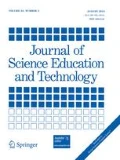Abstract
Though research has shown that students do not have adequate understandings of nature of science (NOS) by the time they exit high school, there is also evidence that they have not received NOS instruction that would enable them to develop such understandings. How early is “too early” to teach and learn NOS? Are students, particularly young students, not capable of learning NOS due to developmental unreadiness? Or would young children be capable of learning about NOS through appropriate instruction? Young children (Kindergarten through third grade) were interviewed and taught about NOS in a variety of contexts (informal, suburban, and urban) using similar teaching strategies that have been found effective at teaching about NOS with older students. These teaching strategies included explicit decontextualized and contextualized NOS instruction, through the use of children’s literature, debriefings of science lessons, embedded written NOS assessments, and guided inquiries. In each context the researchers interviewed students prior to and after instruction, videotaped science instruction and maintained researcher logs and field notes, collected lesson plans, and copies of student work. The researchers found that in each setting young children did improve their understandings of NOS. Across contexts there were similar understandings of NOS aspects prior to instruction, as well as after instruction. There were also several differences evident across contexts, and across grade levels. However, it is clear that students as young as kindergarten are developmentally capable of conceptualizing NOS when it is taught to them. The authors make recommendations for teaching NOS to young children, and for future studies that explore learning progressions of NOS aspects as students proceed through school.

Similar content being viewed by others
References
Akerson VL, Donnelly LA (2010) Teaching nature of science to K-2 students: what understandings can they attain? Int J Sci Educ 32:97–124
Akerson VL, Abd-El-Khalick FS, Lederman NG (2000) Influence of a reflective explicit activity based approach on elementary teachers’ conceptions of nature of science. J Res Sci Teach 37:295–317
Akerson VL, Cullen TA, Hanson DL (2009) Fostering a community of practice through a professional development program to improve elementary teachers’ views of nature of science and teaching practice. J Res Sci Teach 46:1090–1113
Bell RL, Blair LM, Crawford BA, Lederman NG (2003) Just do it? Impact of a science apprenticeship program on high school students’ understandings of the nature of science and scientific inquiry. J Res Sci Teach 40:487–509
Clough MP (2006) Learner’s responses to the demands of conceptual change: considerations for effective nature of science instruction. Int J Sci Educ 15:463–494
DeBoer GE (1991) A history of ideas in science education: implications for practice. Teachers College Press, New York
Lederman JS (2009) Young children’s’ views of science. Illinois Institute of Technology, unpublished manuscript, Chicago
Lederman NG, Abd-El-Khalick F (1998) Avoiding de-natured science: activities that promote understandings of the nature of science. In: McComas W (ed) The nature of science in science education: rationales and strategies. Kluwer, Dordrecht, pp 83–126
Lederman JS, Khishfe R (2002) Views of nature of science form D. Illinois Institute of Technology, unpublished manuscript, Chicago
Lederman NG, Abd-El-Khalick FS, Bell RL, Schwartz RS (2002) Views of nature of science questionnaire: toward valid and meaningful assessment of learners’ conceptions of nature of science. J Res Sci Teach 39:497–521
Metz KE (1995) Reassessment of developmental constraints on children’s science instruction. Rev Educ Res 65(2):93–127
National Academy Press (1996) National science education standards. National Academy Press, Washington, DC
National Science Teachers Association. (2000). NSTA position statement: the nature of science. Retrieved March 18, 2003, from http://www.nsta.org/159&psid=22
Acknowledgments
We would like to thank Cassie Quigley for her support with work at the urban site and Khemmawadee Pongsanon for her support with work at the suburban third grade site.
Author information
Authors and Affiliations
Corresponding author
Rights and permissions
About this article
Cite this article
Akerson, V.L., Buck, G.A., Donnelly, L.A. et al. The Importance of Teaching and Learning Nature of Science in the Early Childhood Years. J Sci Educ Technol 20, 537–549 (2011). https://doi.org/10.1007/s10956-011-9312-5
Published:
Issue Date:
DOI: https://doi.org/10.1007/s10956-011-9312-5




